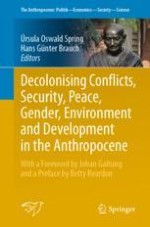2021 | OriginalPaper | Chapter
4. Peaceful Societies Through Social Cohesion? The Power of Paradigms for Normative and Interdisciplinary Research
Author : Katarina Marej
Published in: Decolonising Conflicts, Security, Peace, Gender, Environment and Development in the Anthropocene
Publisher: Springer International Publishing
Activate our intelligent search to find suitable subject content or patents.
Select sections of text to find matching patents with Artificial Intelligence. powered by
Select sections of text to find additional relevant content using AI-assisted search. powered by
